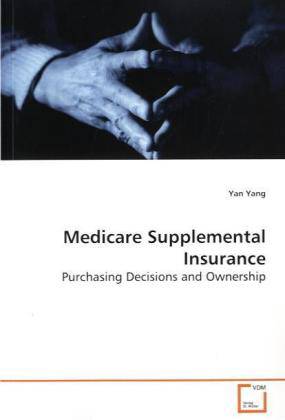
Je cadeautjes zeker op tijd in huis hebben voor de feestdagen? Kom langs in onze winkels en vind het perfecte geschenk!
- Afhalen na 1 uur in een winkel met voorraad
- Gratis thuislevering in België vanaf € 30
- Ruim aanbod met 7 miljoen producten
Je cadeautjes zeker op tijd in huis hebben voor de feestdagen? Kom langs in onze winkels en vind het perfecte geschenk!
- Afhalen na 1 uur in een winkel met voorraad
- Gratis thuislevering in België vanaf € 30
- Ruim aanbod met 7 miljoen producten
Zoeken
€ 71,95
+ 143 punten
Omschrijving
The majority of Medicare beneficiaries rely on supplemental insurance to help fill the gaps in Medicare's benefit package and to protect themselves from large, unanticipated health care expenses. Although numerous studies have been conducted on Medicare Supplemental insurance ownership, few attempts have been made to explore the decision- making process for purchasing Medigap. This book examined decision factors in the dynamics of private supplemental insurance purchases on the conceptual framework of Bounded Rationality. The study used Multilevel modeling to examine the time-dependent relationship of the Medigap purchasing decision on longitudinal data from the Asset and Health Dynamics Among the Oldest-Old Survey (AHEAD). The study has implications for Medicare policies that are designed to enhance health care coverage while containing health care costs through market competition. It is also important for public agencies and other entities helping the disadvantaged elderly make informed enrollment decisions, and for furthering empirical knowledge and research methodology on the behavioral modeling with respect to health insurance purchases.
Specificaties
Betrokkenen
- Auteur(s):
- Uitgeverij:
Inhoud
- Aantal bladzijden:
- 112
- Taal:
- Engels
Eigenschappen
- Productcode (EAN):
- 9783639129236
- Verschijningsdatum:
- 13/03/2009
- Uitvoering:
- Paperback
- Formaat:
- Trade paperback (VS)
- Afmetingen:
- 152 mm x 229 mm
- Gewicht:
- 176 g

Alleen bij Standaard Boekhandel
+ 143 punten op je klantenkaart van Standaard Boekhandel
Beoordelingen
We publiceren alleen reviews die voldoen aan de voorwaarden voor reviews. Bekijk onze voorwaarden voor reviews.









